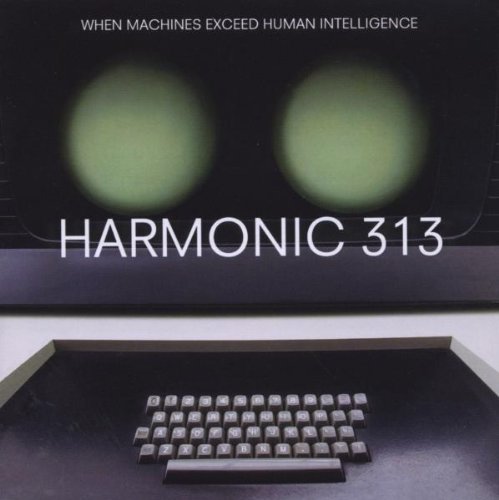
Harmonic 313
When Machines Exceed Human Intelligence
Release Date: Mar 3, 2009
Genre(s): Electronic
Record label: Warp
Music Critic Score
How the Music Critic Score works
Album Review: When Machines Exceed Human Intelligence by Harmonic 313
Very Good, Based on 7 Critics
Based on rating 9/10
J Dilla’s posthumous reputation continues to grow, as it seems every other hot new beat-maker takes influence from James Yancey and his eclectic productions. At the core, Dilla was a hip-hop artist, but, befitting a producer from Detroit, he took influence from soul and techno, two very different genres that both developed in the Motor City. This isn’t to say that “techno soul” is an oxymoronic concept.
Based on rating 8.0/10
The extent of Mark Pritchard's prevalence in the world of electronic music should be intimidating to anyone curious enough to seek out his full discography. Over nearly two decades, Pritchard has operated under six different monikers and jumped across genre boundaries too many times to count. He started putting out dark-tinged post-rave records as Reload, and then joined with Tom Middleton as Global Communication to release 7614, one of the most influential ambient albums of the '90s.
Based on rating 7/10
Unlike the darkly lit ambience of Harmonic 33, Mark Pritchard's alternate similar-titled project, Harmonic 313, is much more beat-oriented, leaving When Machines Exceed Human Intelligence to fall somewhere between the categories of instrumental hip-hop and dubstep. It's fitting that Pritchard adapted Detroit's area code into his new project's name, with more than a few reference points stemming from the 313. As well as sounding like a slowed-down version of early Detroit techno -- borrowing cues from Cybotron, Derrick May, and Freq -- J Dilla's influence looms heavily.
Based on rating 7/10
As one half of Global Communication and Jedi Knights with Tom Middleton, and alone as Link, Reload, Troubleman and more recently Harmonic 33, Mark Pritchard has produced genre-defining ambient, bleep techno, P-funk inflected electro, hip-hop breaks and library music tributes of note. With Harmonic 313 - the numbers a reference to Detroit’s area code - he seems to be adding Detroit techno, Detroit hip-hop (the ghost of much missed producer J Dilla looms large) and the UK bassline style that spawned from speed garage back at the beginning of the millennium to that burgeoning list of styles. As you’d probably expect from a tune called ‘Dirtbox’, the album opener is absolute filth: a huge sub-bass roller that grinds with impressively single-minded intent.
Based on rating 3/5
Though Warp records have diversified over recent years, with artists such as Maximo Park and !!!, Harmonic 313 are one of their more traditional electronic acts. The title reads like a typical release from the label in the early 90s; other cliches include the robotic intonations of a Speak'n'Spell machine, sampled throughout Word Problems. Despite the lack of surprises, this is the work of a talented artist, Mark Pritchard, who has successfully recorded in a dozen dance subgenres, using as many pseudonyms, over the last two decades (Global Communication, which he uses for ambient work, is his best known).
Based on rating 5.7/10
Ever hear Dick Hyman's cover of James Brown's "Give It Up or Turnit a Loose"? It came out in 1969, a year after Wendy (nee Walter) Carlos' Switched-On Bach sold half a million copies and turned the Moog into a must-have instrument for musicians everywhere. Listening to Hyman's reinterpretation of one of Brown's heaviest funk tracks is a weird experience: The first time or two, it almost-- almost-- sounds like an accidental precursor to the late-1990s Timbaland/Neptunes approach to digital hip-hop production, at least in the same way a '32 Ford could be considered a precursor to the Lamborghini Countach. Then the novelty wears off to the point where the rinky-dink bassline and the exasperated robot mosquito substituting for James Brown's vocals sound astonishingly cheap and frivolous.
Opinion: Fairly Good
As one half of Global Communication and Reload, English ex-pat (now relocated to Australia) Mark Pritchard has left a fairly indelible stamp on early 1990s electronic music, from Reload’s baleful Collection of Short Stories, through Global Communication’s tear-drop pure 76:14 and sublime, exemplary “The Way/The Deep” deep house 12”s. That’s serious pedigree – remember, Pritchard’s collaborator Tom Middleton used to hang with the Aphex Twin in deepest Cornwall, too – and early reports of Harmonic 313 had Pritchard back on form, his previous records on Warp betraying an interest in library music and the kind of eldritch, liminal electronica favored by the Focus Group and their Ghost Box brethren. When Machines Exceed Human Intelligence starts with the slumped shuffle of “Dirtbox,” which flashes on the weighty torpor of dubstep; Pritchard’s been listening hard to recent developments in dance music, and parts of this album offer his own, skewed take on these forms.

